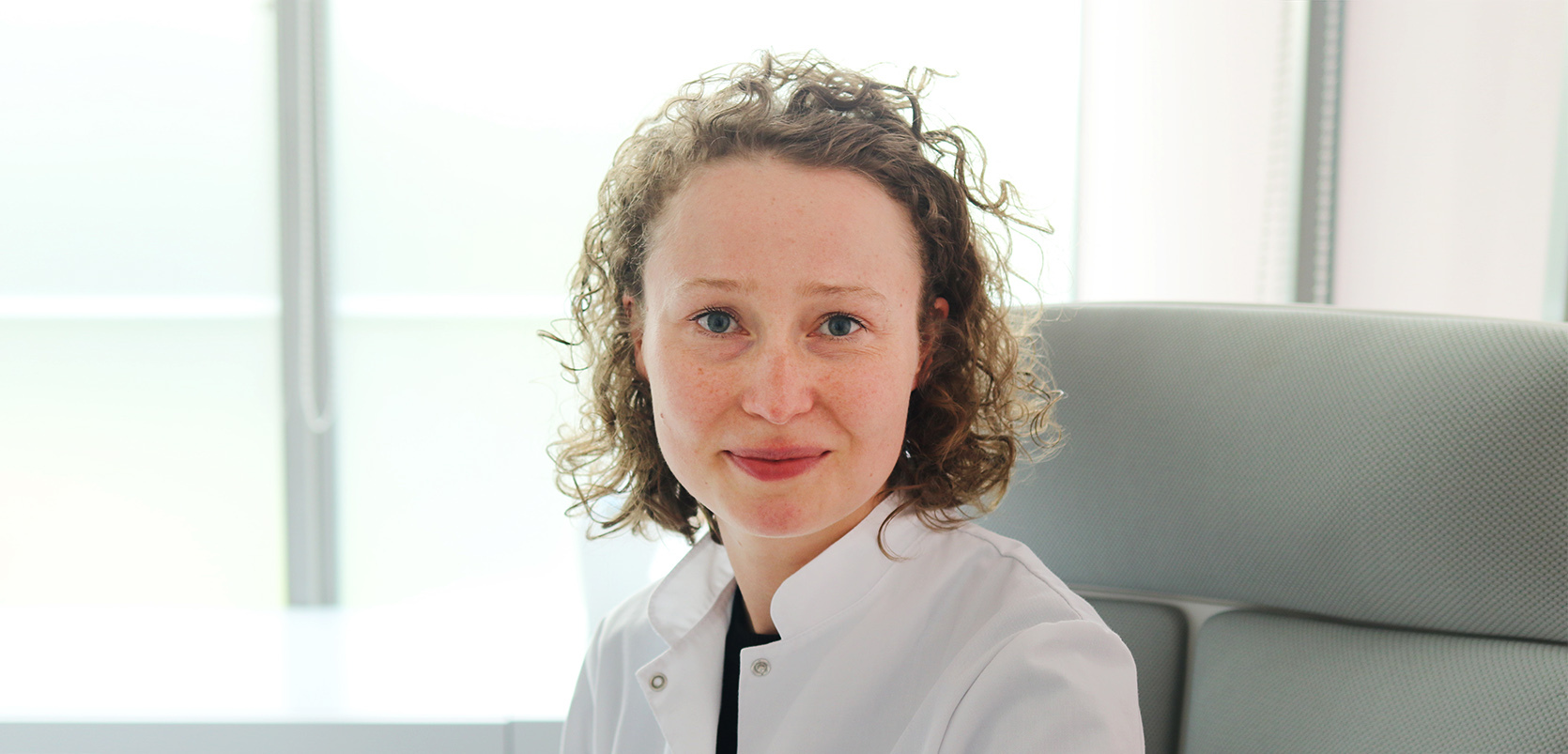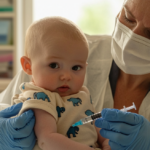
„Statystycznie ryzyko zajścia w ciążę podczas naturalnego karmienia dochodzi nawet do 2 proc., więc jest dość wysokie”. O antykoncepcji po porodzie mówi ginekolożka dr n. med. Dominika Trojnarska
Ewa Podsiadły-Natorska: Na początku opowiedzmy, co dzieje się w organizmie kobiety, która spodziewa się dziecka.
Dr n. med. Dominika Trojnarska: Główną zmianą jest przystosowanie się organizmu do ciąży. Dotyczy to każdego układu, nie tylko osi podwzgórze-przysadka-jajnik, ale także układu oddechowego, krążenia czy pokarmowego. Z tego wynikają różnego rodzaju dolegliwości, np. większa ospałość w pierwszym trymestrze albo nudności i wymioty związane z wpływem hormonów ciążowych na układ pokarmowy. Wszystko to ma na celu przygotowanie organizmu do ciąży i do porodu. W organizmie spodziewającej się dziecka kobiety zwiększa się objętość krwi, więc mimo że liczba czerwonych krwinek pozostaje na tym samym poziomie co wcześniej, to krew jest rozcieńczona, co może dawać negatywne objawy. Dlatego w ciąży wskazana jest suplementacja.
U kobiety w ciąży przede wszystkim jednak zmienia się funkcja jajników. Kobieta przestaje miesiączkować; w momencie kontaktu plemnika z komórką jajową dochodzi do zabezpieczenia przed tzw. polispermią. Ten proces odbywa się po to, żeby komórka jajowa nie została zapłodniona przez więcej niż jeden plemnik. Jednocześnie pojawia się ochrona, aby kobieta, gdy już zajdzie w ciążę, nie zaszła w nią powtórnie.
Kiedy wraca owulacja po porodzie?
Przede wszystkim to zależy od tego, czy kobieta karmi piersią. Jeśli tak, znaczenie ma pierwszych sześć miesięcy po porodzie. Jeżeli w tym czasie kobieta karmi regularnie, tzn. w ciągu dnia co najmniej co cztery godziny, a w nocy co najmniej co sześć godzin, to wtedy prolaktyna utrzymuje się na wysokim poziomie. Hormon ten pobudza produkcję mleka, jednocześnie hamując aktywność jajników, co powoduje, że nie ma owulacji.
Jednak w momencie, gdy matka karmi dziecko coraz rzadziej, dokarmia je odżywkami, a zwłaszcza gdy zaczyna pojawiać się u niej krwawienie miesięczne, poziom prolaktyny zaczyna spadać i uaktywnia się funkcja jajników. Wskutek tego wraca owulacja. Żeby więc karmienie piersią było formą antykoncepcji, musi odbywać się regularne.
Pacjentki nie boją się polegać na wyłącznym karmieniu piersią jako na metodzie ochrony przed ciążą?
Wszystko zależy od tego, jak przebiega karmienie. Statystycznie ryzyko zajścia w ciążę podczas naturalnego karmienia dochodzi nawet do 2 proc., więc jest dość wysokie. Dlatego dla pewności zaleca się stosowanie dodatkowych metod chroniących przed ciążą, zwłaszcza po pierwszych 3–6 miesiącach od porodu.
A jeśli kobieta nie karmi piersią, to co dzieje się z jej owulacją po porodzie?
Wtedy na dobrą sprawę już po 3–4 tygodniach funkcje jajników zaczynają wracać. Oznacza to, że pojawia się ryzyko lub szansa – zależy, jak na to patrzeć – by zajść w ciążę. Cykle mogą być początkowo bezowulacyjne albo owulacyjne już od samego początku. Tego nie jesteśmy w stanie przewidzieć.
Jaką antykoncepcję poleciłaby pani kobiecie po porodzie?
Jeśli kobieta karmi i nie chce lub nie może stosować hormonów, to godne polecenia będą dla niej metody barierowe (mechaniczne): prezerwatywa, w tym prezerwatywa dla kobiet, albo diafragma, czyli umieszczany w pochwie elastyczny kapturek. Diafragmę można jednak założyć najwcześniej trzy miesiące po porodzie z tego względu, że miednica mniejsza potrzebuje czasu, żeby wrócić do swojej wcześniejszej formy. Wcześniej może się okazać za mała, przez co może nie funkcjonować tak, jak powinna. W porównaniu do metod hormonalnych metody barierowe są jednak mniej skuteczne, jeśli chodzi o ochronę przed ciążą.
Kobieta, która karmi piersią, może sięgnąć po hormony?
Po niektóre tak.
W przypadku karmienia polecane są tabletki antykoncepcyjne jednoskładnikowe. Zawierają one tylko gestageny (hormony płciowe żeńskie podobne do progesteronu – przyp. red.), nie mają natomiast w składzie estrogenów, które mogą negatywnie wpływać na ilość produkowanego mleka.
Problem z tabletkami jednoskładnikowymi jest jednak taki, że muszą być przyjmowane bardzo regularnie, co 24 godziny. W momencie, gdy taka tabletka będzie zapomniana albo przesunięta w zażyciu o kilka godzin, może dojść do plamień, co jest przez pacjentki niepożądane. Pominięcie tabletki zwiększa również ryzyko zajścia w ciążę.
Jeśli chodzi o spiralę antykoncepcyjną, to również zawiera ona głównie gestageny, więc można ją stosować w trakcie karmienia, jednak spirala może zostać założona najwcześniej sześć tygodni po porodzie, kiedy macica się obkurczy. Wcześniej mogłaby wypaść, bo macica po porodzie jest większa. Dodatkowo również krwawienie występujące w okresie połogu zwiększa ryzyko, że spirala się z macicy wysunie. Spirale w ogóle polecane są kobietom, które mają już dzieci, a to dlatego, że zakłada się je np. na pięć lat. U kobiet, które dopiero zaczynają dopiero stosować środki antykoncepcyjne, w wieku ok. 18–20 lat, nie zaleca się, żeby od razu zakładać spiralę. Dobrze jest wypróbować inne metody antykoncepcji, żeby zobaczyć, jak kobieta na nie reaguje. Spirala wiąże się z kosztem i długim okresem noszenia.
Z kolei implant antykoncepcyjny też zawiera tylko gestagen, więc również jest bezpieczny podczas karmienia, jednak tutaj trzeba odczekać co najmniej 3–4 tygodnie po porodzie.
A krążek (ring) antykoncepcyjny?
Zarówno ringi, jak i plastry nie są wskazane dla karmiących, podobnie jak tabletki antykoncepcyjne dwuskładnikowe, ze względu na estrogeny. Poza tym problem w przypadku ringów jest podobny, co ze spiralą; po porodzie kanał rodny kobiety, szczególnie jeśli był to poród siłami natury, jest szerszy i istnieje ryzyko, że ring wypadnie.

Polecamy
Pigułki antykoncepcyjne dla mężczyzn? „Nie zaufałabym, no, poza wazektomią, bo to jest jednak dość pewna i stała metoda”
Żeńskie pigułki antykoncepcyjne to oczywistość. A gdyby powstały pigułki antykoncepcyjne dla mężczyzn? Co o tym sądzą kobiety? „Za bardzo boję się ciąży i jej konsekwencji, żeby komukolwiek w tej kwestii ufać i pozwalać na zajmowanie się antykoncepcją „za mnie” – czytamy wpis na facebookowej grupie. Faktycznie, zaufanie jest kluczową sprawą, co potwierdza dr Grzegorz Południewski. – Tak naprawdę kobiety nie ufają partnerom – mówi znany ginekolog.
Kobieta, która nie karmi piersią, ma dowolność w doborze metody antykoncepcji?
Również w tym przypadku dobrze byłoby odczekać kilka tygodni i dopiero wtedy zacząć stosować np. środki hormonalne. Chodzi o to, aby organizm miał możliwość wrócić samodzielnie do stanu sprzed porodu. Najlepiej po prostu przeczekać czas połogu.
Co, jeśli po porodzie kobieta chce opierać się na metodach naturalnych?
Nie polecałabym ich zaraz po porodzie czy w trakcie karmienia piersią, jeśli kobieta nie stosowała ich przed ciążą.
Metody naturalne wymagają bardzo dużej samokontroli i znajomości własnego ciała. Po porodzie nie można stwierdzić precyzyjnie, kiedy cykl miesięczny się unormuje.
Chyba że kobieta dobrze zna swój organizm, to należy odczekać okres połogu, czyli sześć tygodni, i dopiero wtedy zacząć stosować metody naturalne. Zastrzegam jednak, że jeśli kobieta karmi piersią, to trudno będzie jej obserwować swój organizm. Np. metoda termiczna, związana z mierzeniem temperatury, będzie nieskuteczna – przez produkcję mleka temperatura ciała jest naturalnie podwyższona.
Sposób porodu ma znaczenie, jeśli chodzi o dobór antykoncepcji?
Często kobiety po cięciu cesarskim, zwłaszcza jeśli było ono wykonane w sposób planowy, mają później uruchomioną produkcję mleka. Potrzeba trochę więcej czasu, żeby laktacja się u nich rozkręciła. Wskazania do metod hormonalnych się nie zmieniają, podobnie jak do metod barierowych – forma porodu nie ma znaczenia.
Ciekawi mnie jeszcze jedno: czy często pani pacjentki, które są matkami, przyznają, żeby wolałyby, żeby to mężczyzna zdecydował się np. na wazektomię?
W Polsce jeszcze nie spotkałam się z pacjentką, która by coś takiego powiedziała.
O, szkoda.
Niestety. W Polsce jestem od dwóch lat i przez te dwa lata nie miałam takiej sytuacji. W Niemczech, gdzie pracowałam, to się zdarzało, szczególnie gdy panie urodziły więcej niż trójkę dzieci. Niekiedy się śmiały i mówiły: „Urodziłyśmy dzieci, to teraz mąż niech ma jakiś zabieg”. Bywały też sytuacje, gdy pacjentki miały wykonany zabieg sterylizacji, czyli podwiązania, przecięcia lub usunięcia jajowodów, z różnych wskazań medycznych lub po prostu na życzenie. Często wskazaniem było to, że miały za sobą liczne cesarskie cięcia i nie planowały już zajść w kolejną ciążę. Oczywiście zabiegi sterylizacji były bardzo ściśle uregulowane pod względem prawnym. Pamiętam, że przy zabiegu laparoskopowym lekarz miał m.in. obowiązek poinformować, że zabieg sterylizacji u kobiety jest obarczony dużo większym ryzykiem niż zabieg wazektomii u mężczyzny, który jest wykonywany w znieczuleniu miejscowym, podczas gdy sterylizacja – w ogólnym lub co najmniej podpajęczynówkowym.
W Polsce wykonuje się sterylizację ze względów medycznych?
Ze wskazań medycznych tak. Nie ma natomiast sterylizacji na życzenie.
Załóżmy, że kobieta urodziła dziecko i po jakimś czasie chce zajść w ciążę. Jak to zaplanować z głową?
Rozsądnie jest odczekać po porodzie siłami natury dobre sześć miesięcy, a w przypadku cięcia cesarskiego co najmniej rok, żeby dać macicy i bliźnie trochę więcej czasu na regenerację. Ten okres odczekania jest ważny, żeby uniknąć powikłań.
A jeśli kobieta zajdzie w ciążę wcześniej?
Jeśli będzie pod kontrolą lekarską, powinno być wszystko w porządku. Mam pacjentki, które po cesarskim cięciu nawet trzy miesiące później zachodzą w kolejną ciążę. Dla nas, jako lekarzy, czyli z punktu widzenia medycznego, jest to nierozsądne, ale to się zdarza i nie należy pacjentek oceniać. Natomiast przy wypisie ze szpitala każda pacjentka powinna być poinformowana o rekomendowanych okresach przerwy między kolejnymi ciążami.
Dr n. med. Dominika Trojnarska – ginekolog-położnik. Ukończyła studia w Polsce (Collegium Medicum Uniwersytetu Jagiellońskiego), a doktorat i specjalizację zdobyła w Niemczech. Szkoliła się m.in. w Stanach Zjednoczonych, Irlandii, Austrii. W swojej pracy zajmuje się głównie ginekologią ogólną, lecz również nakierowaną na onkologię. Specjalizuje się m.in. w kolposkopii, endoskopowej chirurgii mikroinwazyjnej oraz medycynie laserowej.




































